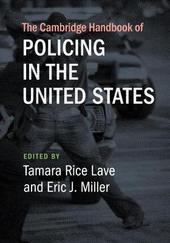
|
The Cambridge Handbook of Policing in the United States
Paperback / softback
Main Details
| Title |
The Cambridge Handbook of Policing in the United States
|
| Authors and Contributors |
Edited by Tamara Rice Lave
|
|
Edited by Eric J. Miller
|
| Series | Cambridge Law Handbooks |
|---|
| Physical Properties |
| Format:Paperback / softback | | Pages:613 | | Dimensions(mm): Height 253,Width 176 |
|
| ISBN/Barcode |
9781108430500
|
| Classifications | Dewey:363.20973 |
|---|
| Audience | | Professional & Vocational | | Postgraduate, Research & Scholarly | |
|---|
| Illustrations |
Worked examples or Exercises; 10 Tables, black and white; 18 Line drawings, black and white; Worked examples or Exercises; 10 Tables, black and white; 18 Line drawings, black and white
|
|
Publishing Details |
| Publisher |
Cambridge University Press
|
| Imprint |
Cambridge University Press
|
| Publication Date |
17 September 2020 |
| Publication Country |
United Kingdom
|
Description
The Cambridge Handbook of Policing in the United States provides a comprehensive collection of essays on police and policing, written by leading experts in political theory, sociology, criminology, economics, law, public health, and critical theory. It unveils a range of experiences - from the police chief of a major metropolitan force to ordinary people targeted for policing on the street - and asks important questions about whether and why we need the police, before analyzing the law of policing, police use of force, and police violence, paying particular attention to the issue of discrimination against marginalized and vulnerable communities at the blunt end of police interference. The book also discusses technological innovations and proposals for reform. Written in accessible language, this interdisciplinary work will be a valuable resource for anyone interested in understanding the present and future of policing in the United States.
Author Biography
Tamara Rice Lave is a Professor of Law at the University of Miami. She is also a Criminal Justice Studies Fellow at the University of California, Berkeley. Before getting her Ph.D., Professor Lave was a deputy public defender in San Diego for ten years where she handled a variety of cases. Eric J. Miller is a Professor and Leo J. O'Brien Fellow at Loyola Law School in Los Angeles. He is currently the Chair-Elect of the Association of American Law Schools (AALS) Section on Criminal Justice, and the co-founder of the Policing Los Angeles Forum. Miller is a nationally recognized expert on the police and policing who has provided testimony to the United States Congress House Judiciary Committee and the United States Sentencing Commission.
Reviews'This is not your average book about policing. It draws from a wide range of disciplines - not just law and criminology, but political science, sociology and economics - to provide a rich tapestry of insights into what policing is, its benefits and dangers, and how it should change. If you want to understand modern debates about policing, including whether it should continue to exist at all, this book is a must read.' Christopher Slobogin, Milton Underwood Professor Law, Vanderbilt University Law School 'This important and compelling book brings together the nation's leading experts on the law, political theory, sociology, and criminology of policing. The authors tackle some of the most urgent contemporary debates in policing, including uses of force, technological innovations, street level police practices, and reform proposals. This book is required reading for anyone interested in the law and practice of policing in the United States.' L. Song Richardson, Dean of University of California Irvine School of Law 'This volume provides an excellent array of perspectives on policing in 28 essays by an impressive collection of respected authors. They deal with the good and bad aspects of operation of police on the street and provide strong understanding of the problems and approaches to improving their performance in the diverse communities of America.' Alfred Blumstein, Carnegie Mellon University 'This sophisticated collection brings together a rich group of thinkers and viewpoints. Offering an elegant mix of policy expertise, community perspectives, social science, legal theory, and philosophy, it is at once critical and appreciative of the complex role played by policing throughout our democracy. The book is strongly interdisciplinary - it melds scholarship on social vulnerability and race with inquiries into such wide-ranging topics as police unions, technology, big data, and violence. Scholars, students, and experts alike will learn much from this provocative volume.' Alexandra Natapoff, University of California and author of Punishment Without Crime: How Our Massive Misdemeanor System Traps the Innocent and Makes America More Unequal
|